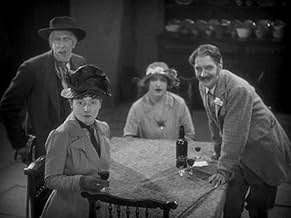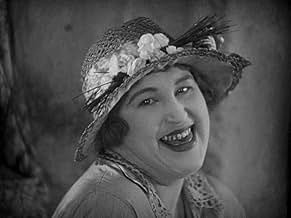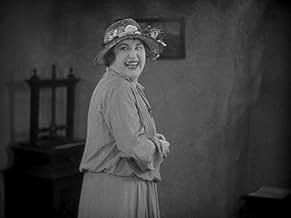AVALIAÇÃO DA IMDb
5,8/10
3,3 mil
SUA AVALIAÇÃO
Adicionar um enredo no seu idiomaAfter his daughter weds, a middle-aged widower with a profitable farm decides to remarry, but he has problems choosing a suitable mate.After his daughter weds, a middle-aged widower with a profitable farm decides to remarry, but he has problems choosing a suitable mate.After his daughter weds, a middle-aged widower with a profitable farm decides to remarry, but he has problems choosing a suitable mate.
- Direção
- Roteiristas
- Artistas
Lillian Hall-Davis
- Araminta Dench - Sweetland's Housekeeper
- (as Lilian Hall-Davis)
Diana Napier
- Sibley Sweetland
- (as Mollie Ellis)
Harry Terry
- Guest at Wedding Breakfast
- (não creditado)
- …
Avaliações em destaque
I saw this years ago, enjoyed but forgot about it. On retrospect it seems a very long drawn out 96 minute comedy film with a flimsy plot, even so I wonder what a 129 minute version would be like.
Jameson Thomas plays thicko widower farmer who can't see beyond the end of his nose when it comes to looking to honour a woman by marrying him. It's obvious from the first reel what the story will be and the eventual conclusion, but for all that it's still well worth watching. Some of the outdoor shots are delightful, portraying the English countryside impressionistically, the indoor usually portray people in the throes of pigging themselves within slapstick routines. The farmers' handyman Gordon Harker was even stranger than his master, with make up absolutely caked on his face for some reason.
Altogether, a nice little film, totally inconsequential but with some nice touches from Hitch and fluid camera movements, all helping maintain interest.
Jameson Thomas plays thicko widower farmer who can't see beyond the end of his nose when it comes to looking to honour a woman by marrying him. It's obvious from the first reel what the story will be and the eventual conclusion, but for all that it's still well worth watching. Some of the outdoor shots are delightful, portraying the English countryside impressionistically, the indoor usually portray people in the throes of pigging themselves within slapstick routines. The farmers' handyman Gordon Harker was even stranger than his master, with make up absolutely caked on his face for some reason.
Altogether, a nice little film, totally inconsequential but with some nice touches from Hitch and fluid camera movements, all helping maintain interest.
Alfred Hitchcock- my personal favourite director- has done better with the likes of Psycho, Vertigo, Rear Window, Rebecca, The Lady Vanishes, Strangers on a Train and North By Northwest but he has also done worse with Juno and the Paycock, Champagne, Number Seventeen, Jamaica Inn, Topaz and Under Capricorn(though all have their redeeming merits). The Farmer's Wife is neither among the best or worst of Hitchcock, but it is still well worth watching and among the better of his silent films. It is too long, can get pedestrian and somewhat too slight in places(with a beginning that takes a little too long to set up) and the music score can feel repetitive. However, it is well shot and has lovely scenery, one of the better looking films of Hitchcock's silent era. Prepare yourself for a lot of point-of-view camera shots but they are not distracting at all(some may think differently though). Hitchcock directs with assurance and technical skill though he has done better in films more in his comfort zone. With the house party there are many subtle touches where you are thinking "yeah, this is unmistakably Hitchcock". The comedy is funny and charming if occasionally falling on the broad side, thankfully it is not overplayed and played with a degree of subtlety while making clear that the actors are enjoying themselves. The story is not always involving but does have its charms and you will be drawn in by the comedy and the likable if stock characters, it may have its slow spots but stick with it. The ending is very touching. The acting is good, again at times broad but not too much or that continuous. Gordon Harker is the standout and is immensely fun to watch, though Lillian Hall-Davies is suitably sympathetic and Jameson Thomas carries the film competently(his character is not easy to warm to straight away this said). Overall, interesting and providing that you don't expect masterpiece status- this is early Hitchcock where he was still finding his feet/style in a way- is also a good film. 7/10 Bethany Cox
"The Farmer's Wife" is a charming rustic, semi-romantic comedy from the silent picture era. Without seeing the credits, you might never guess that it was made by the "Master of Suspense", Alfred Hitchcock - but if you know who the director was, it is easy to see the masterful touches Hitchcock was known for.
The story is a simple one. Farmer Sweetland (Jameson Thomas) has lost his beloved wife some time ago, and comes to decide that he should marry again. He methodically evaluates, and plans to propose to, all of the eligible women he can think of. But all the while he overlooks the best, and obvious (to the audience) choice: his devoted housekeeper Araminta (Lillian Hall-Davis, who is charming in the role). "Minta" is far wiser, sweeter, and prettier than the other candidates, and she also cares for Sweetland in a way they never will. The plot, therefore, revolves around whether he will figure this out before he gets stuck with an unsuitable mate instead.
Hitchcock applies the creativity and attention to detail that he would later use in his great suspense films, and makes out of a simple plot a movie that is very funny, and also at times quite touching. A great deal of the characters' feelings and thoughts are communicated without dialogue cards, through masterful silent camera work. The most powerful recurring image is a pair of chairs near the fireplace, where Farmer Sweetland had obviously spent many happy hours with his dear departed first wife. Early in the film, as he hosts a wedding dinner for his daughter, he begins to look longingly at the chairs, and we know what he is thinking even before the dialogue cards tell us. As the film proceeds, we occasionally come back to the fireplace, and eventually "Minta" begins to sit with him by the fireplace, sympathizing and helping with his disappointed matrimonial projects. The suggestion is obvious to everyone but Sweetland.
In the lead role, Thomas responds to Hitchcock's direction, sometimes making his character appear somewhat ridiculous in his miscalculated plans, and at other times evoking our complete sympathy and pity for his loneliness. The rest of the cast works very well too, especially Gordon Harker, whose expert comic timing plays wonderfully in the role of Farmer Sweetland's handyman.
There is one long, hilarious comic sequence, at a house party hosted by one of Sweetland's prospective mates, and you have to watch it two or three times to catch all of the detail Hitchcock packed into the sequence. The rest of the movie is filled with lighter comic touches, and concentrates on giving us a surprisingly tender look at the characters' lives.
Hitchcock fans should take delight in seeing how the master used his talents in such a different genre, and any fan of romantic comedies who is willing to try a silent film should also enjoy "The Farmer's Wife".
The story is a simple one. Farmer Sweetland (Jameson Thomas) has lost his beloved wife some time ago, and comes to decide that he should marry again. He methodically evaluates, and plans to propose to, all of the eligible women he can think of. But all the while he overlooks the best, and obvious (to the audience) choice: his devoted housekeeper Araminta (Lillian Hall-Davis, who is charming in the role). "Minta" is far wiser, sweeter, and prettier than the other candidates, and she also cares for Sweetland in a way they never will. The plot, therefore, revolves around whether he will figure this out before he gets stuck with an unsuitable mate instead.
Hitchcock applies the creativity and attention to detail that he would later use in his great suspense films, and makes out of a simple plot a movie that is very funny, and also at times quite touching. A great deal of the characters' feelings and thoughts are communicated without dialogue cards, through masterful silent camera work. The most powerful recurring image is a pair of chairs near the fireplace, where Farmer Sweetland had obviously spent many happy hours with his dear departed first wife. Early in the film, as he hosts a wedding dinner for his daughter, he begins to look longingly at the chairs, and we know what he is thinking even before the dialogue cards tell us. As the film proceeds, we occasionally come back to the fireplace, and eventually "Minta" begins to sit with him by the fireplace, sympathizing and helping with his disappointed matrimonial projects. The suggestion is obvious to everyone but Sweetland.
In the lead role, Thomas responds to Hitchcock's direction, sometimes making his character appear somewhat ridiculous in his miscalculated plans, and at other times evoking our complete sympathy and pity for his loneliness. The rest of the cast works very well too, especially Gordon Harker, whose expert comic timing plays wonderfully in the role of Farmer Sweetland's handyman.
There is one long, hilarious comic sequence, at a house party hosted by one of Sweetland's prospective mates, and you have to watch it two or three times to catch all of the detail Hitchcock packed into the sequence. The rest of the movie is filled with lighter comic touches, and concentrates on giving us a surprisingly tender look at the characters' lives.
Hitchcock fans should take delight in seeing how the master used his talents in such a different genre, and any fan of romantic comedies who is willing to try a silent film should also enjoy "The Farmer's Wife".
This early Hitchcock silent, his first for British International Pictures, is a simple romantic comedy adapted from a stage play. A far cry from crime and suspense, but at this point Hitchcock had neither the influence nor the realisation of his true forte to select his projects.
As with all but one of the Hitchcock silents, the screenplay was by Eliot Stannard. Stannard, with his typical understanding of the visual medium, dispenses with the wordiness of a direct stage-to-screen adaptation. He allows time for the characters to reveal their feelings in reaction shots and point-of-view shots, and replaces verbal gags with visual ones. The Farmer's Wife is thus as devoid of unnecessary intertitles as, say, The Manxman.
Given its rural setting, Hitchcock was more or less obliged to include some shots of rolling hillsides. Hitch doesn't seem to have liked the countryside much – in most of his later films if it appears at all it's as a functional back-projection – but he doesn't do too badly here as far as pure photographic beauty goes. Other than that the shooting style is typical of Hitchcock. There is a growing use of fluid camera movement, and we can see that Hitchcock technique, whereby the camera appears to be leading the audience, gradually revealing to us or drawing us in.
Whether it comes from Stannard's script or Hitchcock's head I don't know, but there is a massive tendency here towards point-of-view shots during dialogue scenes, in which the other speaker looks straight into camera. The majority of these are rather pointless, with the exception of several appropriately ghastly close-ups of the Farmer's bridal candidates.
To say the conclusion of The Farmer's Wife is predictable would be a grand understatement. A shortsighted person could see it coming through several miles of fog. Not a bad thing in itself, but rather than play upon its obviousness (which Stannard and Hitchcock must have been aware of), the picture simply becomes a tedious game of waiting for the inevitable. The Farmer's Wife is only quite funny, and is altogether too long.
As with all but one of the Hitchcock silents, the screenplay was by Eliot Stannard. Stannard, with his typical understanding of the visual medium, dispenses with the wordiness of a direct stage-to-screen adaptation. He allows time for the characters to reveal their feelings in reaction shots and point-of-view shots, and replaces verbal gags with visual ones. The Farmer's Wife is thus as devoid of unnecessary intertitles as, say, The Manxman.
Given its rural setting, Hitchcock was more or less obliged to include some shots of rolling hillsides. Hitch doesn't seem to have liked the countryside much – in most of his later films if it appears at all it's as a functional back-projection – but he doesn't do too badly here as far as pure photographic beauty goes. Other than that the shooting style is typical of Hitchcock. There is a growing use of fluid camera movement, and we can see that Hitchcock technique, whereby the camera appears to be leading the audience, gradually revealing to us or drawing us in.
Whether it comes from Stannard's script or Hitchcock's head I don't know, but there is a massive tendency here towards point-of-view shots during dialogue scenes, in which the other speaker looks straight into camera. The majority of these are rather pointless, with the exception of several appropriately ghastly close-ups of the Farmer's bridal candidates.
To say the conclusion of The Farmer's Wife is predictable would be a grand understatement. A shortsighted person could see it coming through several miles of fog. Not a bad thing in itself, but rather than play upon its obviousness (which Stannard and Hitchcock must have been aware of), the picture simply becomes a tedious game of waiting for the inevitable. The Farmer's Wife is only quite funny, and is altogether too long.
Very funny. I never realized Hitchcock could do slapstick. Surprised to find the story and characters easy to follow and identify with even with the near lack of title cards. The best silent Hitchcock film I have seen and maybe the funniest film he ever made.
Você sabia?
- CuriosidadesUnlike most of his later films, this film does not have a cameo by Sir Alfred Hitchcock.
- Erros de gravaçãoAfter Louisa rejects Farmer Sweetland, his horse changes position it between shots as he mounts it.
- Citações
Farmer Sweetland: ...I am a man that a little child can lead but a regiment of soldiers couldn't drive.
Principais escolhas
Faça login para avaliar e ver a lista de recomendações personalizadas
Detalhes
Bilheteria
- Faturamento bruto mundial
- US$ 152
- Tempo de duração
- 1 h 40 min(100 min)
- Cor
- Mixagem de som
- Proporção
- 1.33 : 1
Contribua para esta página
Sugerir uma alteração ou adicionar conteúdo ausente


































